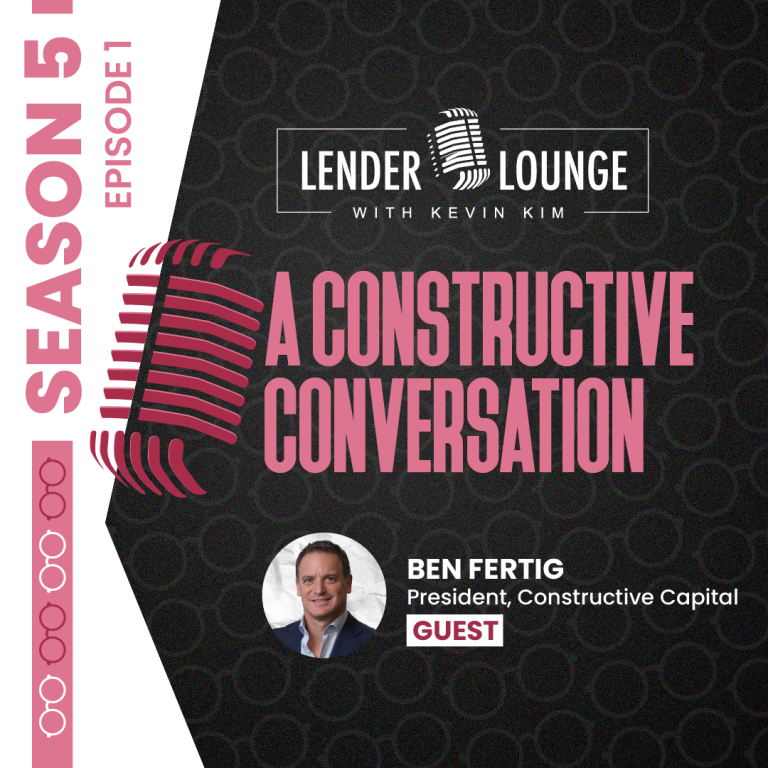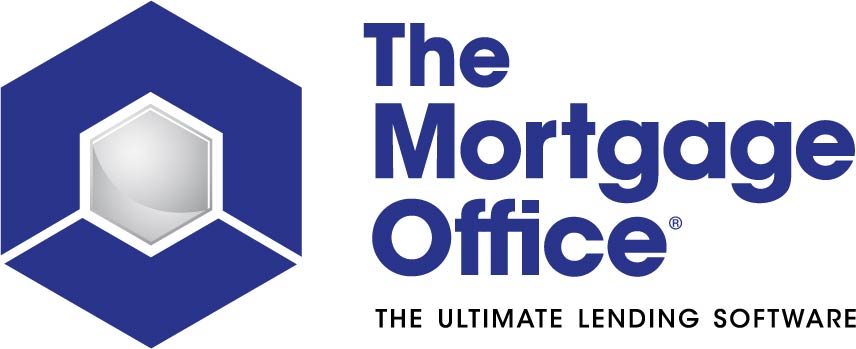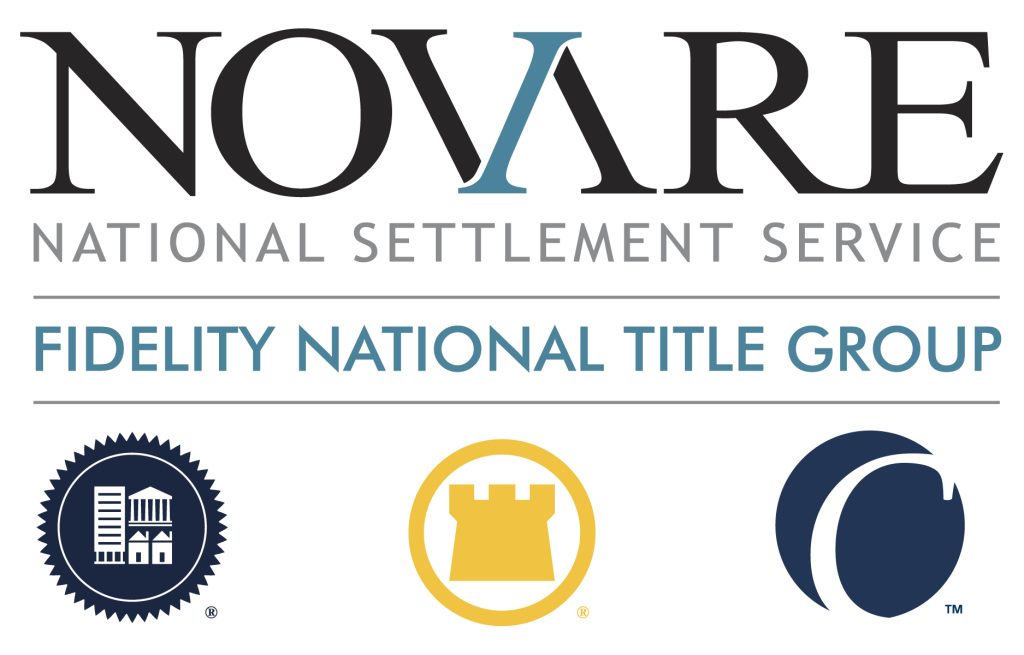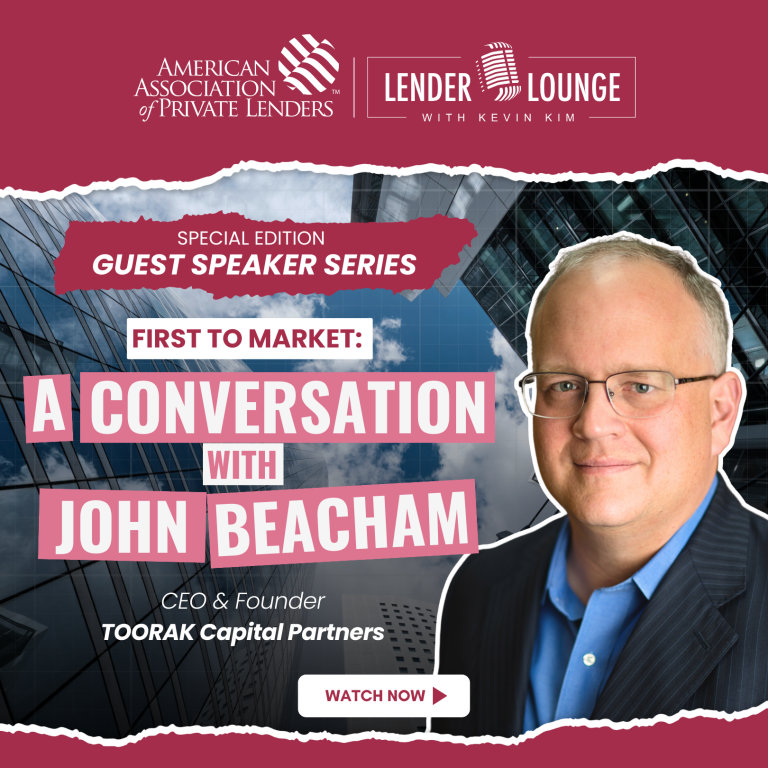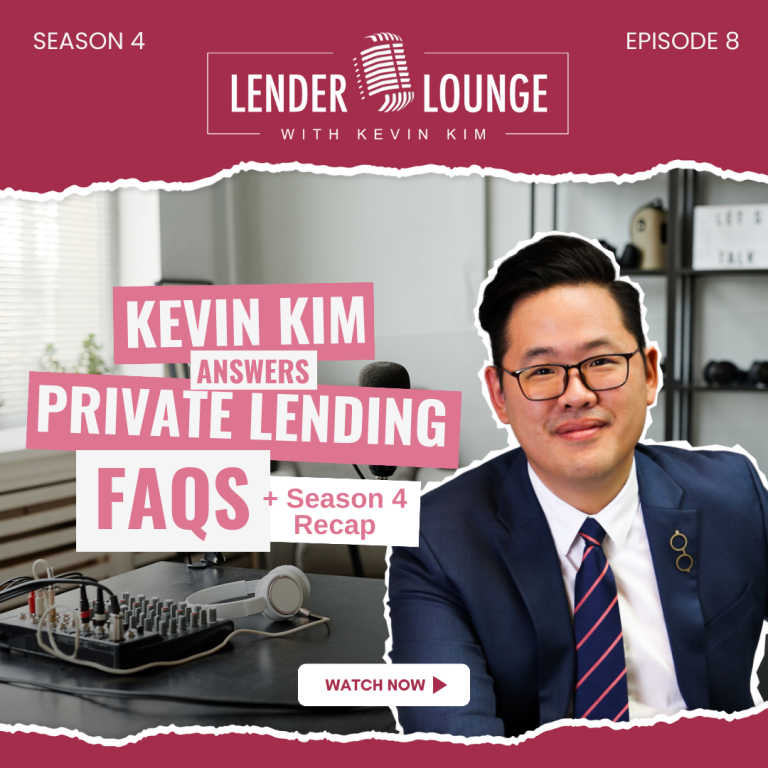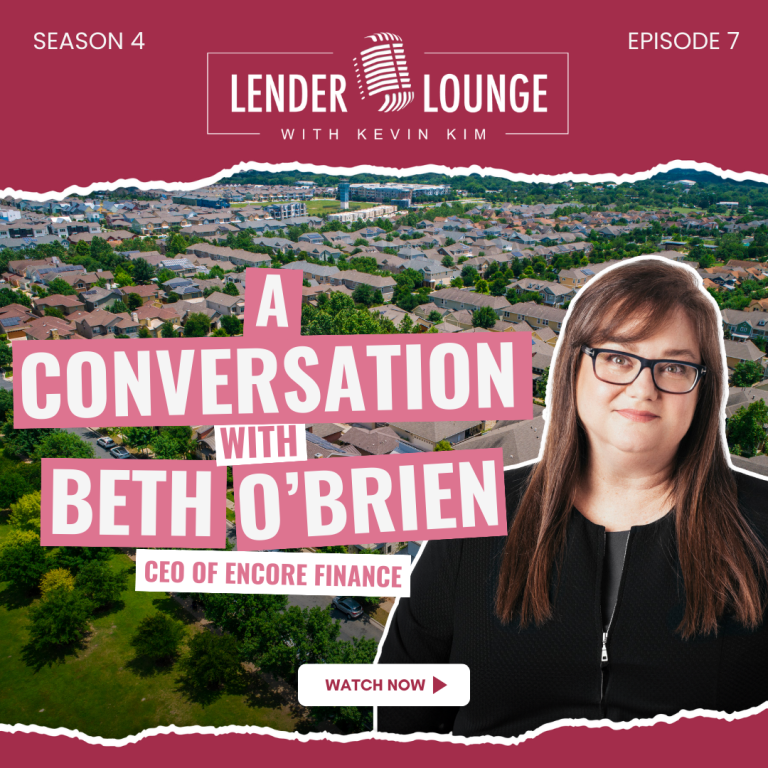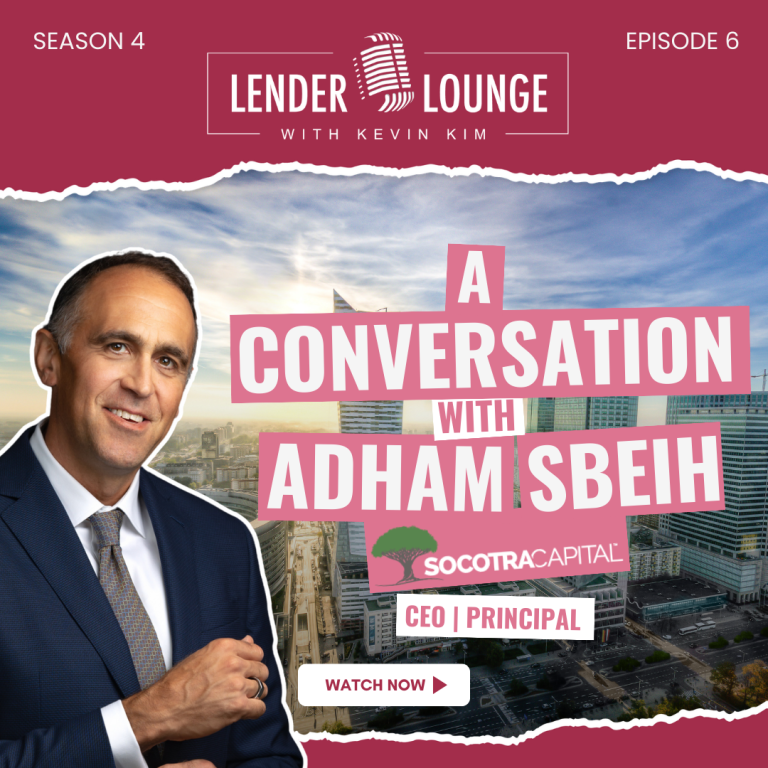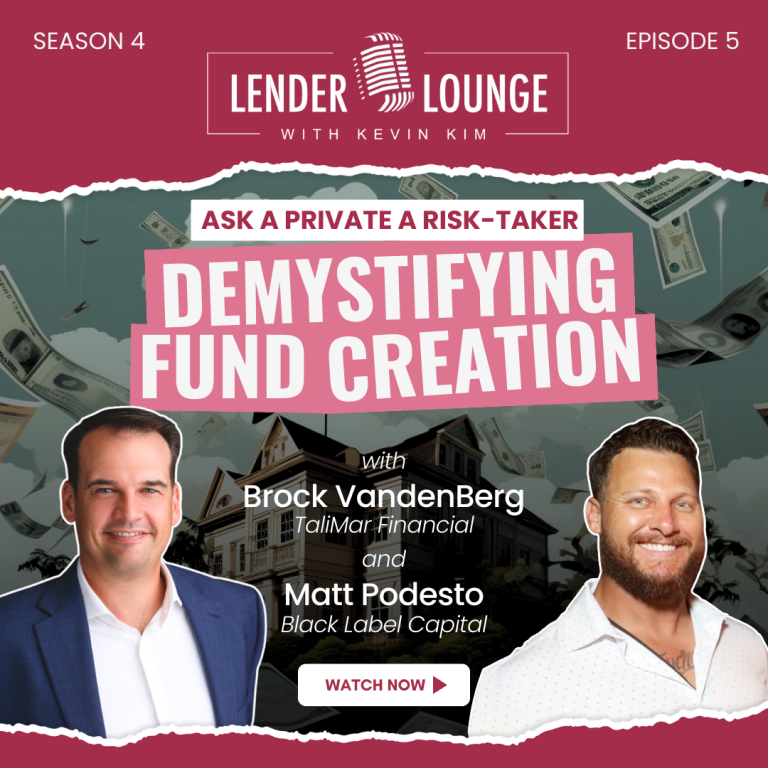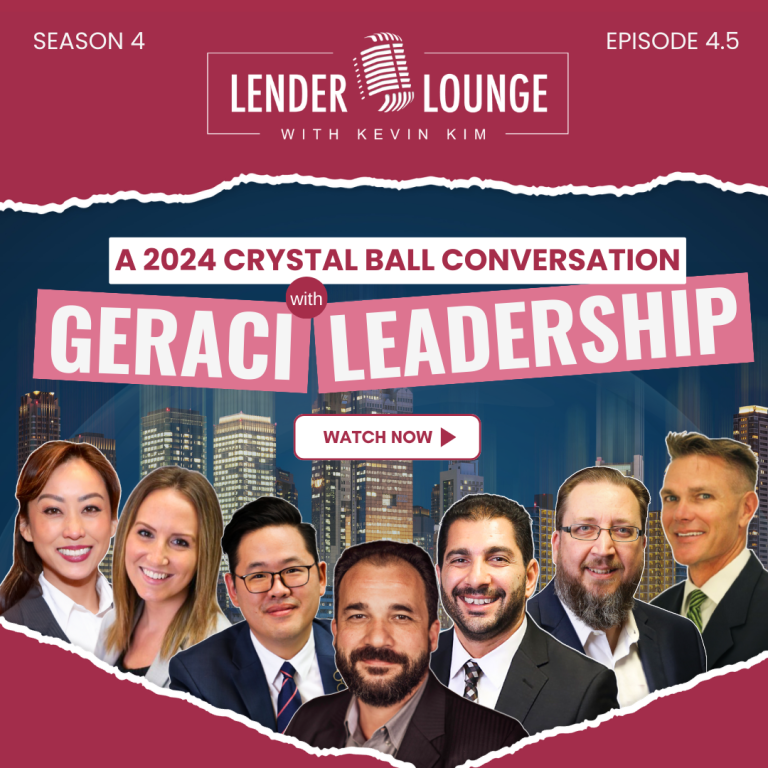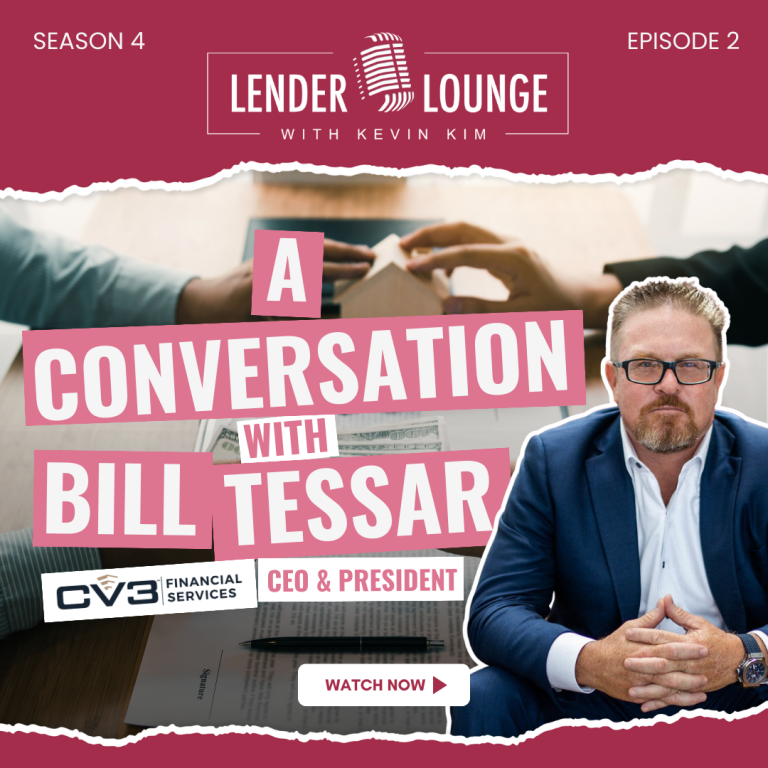Kevin Kim: You are listening to Lender Lounge with Kevin Kim, a podcast dedicated to helping those in the private lending industry grow, improve, and streamline their business. I’m Kevin Kim, partner at Geraci LLP, the nation’s largest private lending law firm. Join me as we chat with the best and brightest in private lending, who are eager to share their years of wisdom and best practices with lenders, borrowers, brokers, and investors.
Kevin Kim: Investors and more subscribe to Lender Lounge on your favorite podcast platform and learn more about Geraci and how we can work with you at geracilawfirm.com. Check out the episode summary for other valuable resources. Hey everyone, welcome back to season five of Lender Lounge with yours truly Kevin Kim.
Kevin Kim: I am truly excited to bring back guests today. One of our favorite guests, clients and one of my favorite people in private lending. Ben, welcome back to the show. Uh, for our audience who don’t know who you are and don’t know about Constructive, please introduce yourself to our audience and we’ll get started.
Ben Fertig: Yeah, [00:01:00] no, thanks, Kev. It’s great to be here. And, uh, to your point, um, I’m a returning guest, so I have my Lender Lounge microphone from, from the last time I will have to know you didn’t send me a new one. Uh, I’ve got my Lender Lounge coffee mug. Hell yeah. And if you want a real mug, and this is, this, this is my everyday mouse pad.
Ben Fertig: Nice. Lady got us down. So, I have my Geraci, uh, affiliated swag here. Um, but look, it’s, it, it’s great to be back. You know, Ben Fertig, I’m the president of Constructive Capital and Constructive deploys capital, uh, into several residential investor asset classes, most primarily, uh, DSCR rental loans, um, and residential transitional loans or fix and flip [00:02:00] loans.
Ben Fertig: Those include, you know, bridge ground-up construction loans. And we do everything, uh, through a network of third-party partners. Um, and just a little bit of background, the company was incepted back in, uh, 2017, and believe it or not. And I think, you know, you’re obviously very familiar with our operations, um, both as counsel in some cases, uh, and as the provider of our, of our closing docs through lightning docs.
Ben Fertig: Um, so, you know, we’ve been look, we’ve been at scale for, for quite a while, um, you know, at a 9-figure monthly run rate. But, uh, believe it or not, um, you know, this is going to be our largest, uh, origination production month. And last month, up until this month was our largest production originate. I’m not sure why exactly.
Ben Fertig: Um, you know, I don’t think there’s anything that [00:03:00] is specific within the market conditions. And I think you and I talked offline that, you know, you’re not necessarily seeing that across the industry or your client base. Um, but things are extremely, uh, extremely busy over here.
Kevin Kim: First of all, congratulations on the best-ever month.
Kevin Kim: Always nice to break records. Uh, internally, we’ve always, we’ve always been excited to watch your guy’s growth. And we were really excited to partner with you guys through like Knox and the law firm when you guys, you know, came onto the market. But I, as counsel and as your kind of loan doc provider, we’ve seen one perspective of the business, but there’s a lot of other things that happen behind the scenes.
Kevin Kim: And in our audience, most of our audience, you know, likes to listen, to learn, right? From, from those who have built their businesses, uh, learn from their, learn from mistakes, listen to their advice and so on and so forth. This is a good topic to have today because, within a seven-year window to get to a nine [00:04:00] figure run rate, that’s supremely impressive.
Kevin Kim: Um, but it couldn’t have been easy. And so, you know, kind of give us a little bit of the key milestones from during those seven years, as you, how, as you built out the company, because like a lot of folks don’t know the, the, the, the detailed history and the milestones of Constructive, right. A lot of folks know you guys, a lot of folks work with you guys, but they don’t know a lot about
Kevin Kim: your, your, your story, right? Where a lot of the other companies, it’s pretty, they’ve been around a little bit longer, you know, and they, and they’ve cut, you know, they’re more, I guess we can call it well known out there when it comes to the backstory. Um, but that’s part of the show, right? We want to give the backstory behind the business, you know?
Ben Fertig: Yeah, look, and I mean, I think there’s a lot of key takeaways, I think, from the backstory, um, that I, that I hope are, are relevant to the listener base, but the company was incepted in the 4th quarter of 2017, um, which was a, a partnership, uh, [00:05:00] between myself and at the time, uh, the 2nd largest, uh, specialty servicer of residential assets, uh, or the owner ownership group of that, uh, servicer who now is the largest and specialty servicer of residential assets.
Ben Fertig: Look, we made the first loan in 2018. It was, it was me and one other individual, um, who, you know, um, she was, her and I were basically out of a basement office, uh, that the, the owners, um, had maintained. And, you know, look, I think one of the things that we did, and we did grow, grow quickly because I think everybody, you know, from, from that perspective, when your startup does, at least on a relative basis, um, we grew quickly, uh, but we were very focused on risk management.
Ben Fertig: So, the growth was, was organic. We knew that over time, you know, at the end of the day, when things get difficult, you need to have access to [00:06:00] capital. If you’re mortgage banking and, you know, just throughout my career, I’ve been mortgage banking 28, 28 years now. And I’ve been through a few crises. Um, you know, I think we, there was some difficulty, I think, getting off the ground.
Ben Fertig: We were certainly, you know, by design missing opportunities, you know, I think related to how we were, we were looking at risk, but. You know, we, we started to build the company, and I think throughout 2018, ‘19 and going into ‘20, we started to see organic growth that was exciting to us. Um, and then, you know, we had gotten to the point where we really were comfortable.
Ben Fertig: We’d scaled the business, and we were actually, this is no joke, I mean, I was out at your, uh, I was out at your conference in Newport. You had it in February, the year of COVID. It was strange because you and I both know, it was like, [00:07:00] you had heard of COVID, but everything was still pretty normal. Um, you know, went to the conference, we weren’t wearing masks.
Ben Fertig: We were out, um, you know, going to dinner, fly back, right? Um, and we were in the middle of, uh, you know, our pipeline was growing. So, we start, you know, we took off in March and it was, it was, there was just no question it was going to be the best month in the history of the company. You know, and then you get to that, uh, 3rd week of March and, you know, everything just, uh, seized, um, you know, the equity markets, of course, you know, our capital markets, um, you know, so we, we actually, we got the reputation for actually lending through, if you remember lending through, um, what most people call, you know, the COVID shutdown, you know, but that really wasn’t, you know, uh, done strategically.
Ben Fertig: We did make a few loans where I think we felt that, you know, the liability of not making those [00:08:00] loans was probably worse than making the fricking loan. But, um, you know, so, and, and at that point what had happened was the preponderance of what was in our pipeline, we didn’t fund. So, we’d had all these broker clients, um, that had borrowers that were obviously extremely unhappy.
Ben Fertig: But what we did is, you know, we, we, we engaged in this campaign where we went back and we tried to make everybody whole that we could cost us about half a million dollars, got into refunding or reimbursing, I should say, some of the underlying borrower base of our clients earnest money, for instance, um, you know, we had paid out a couple of, uh, you know, 22, 000 refunds, um, for, for borrowers earnest money.
Ben Fertig: And, you know, so I think like relative to the situation, nobody was happy, but I think, you know, I think that resonated. [00:09:00] And then, you know, as we kind of worked through that time, we had a number of, of loans on our balance. We, we probably, we had a fairly large, uh, population of DSCR loans on our balance sheet that, you know, were certainly worth less than par at the time because there was just no bids in the market.
Ben Fertig: And, um, you know, we ended up taking a loss on those loans, but we moved on. I mean, thankfully we were, we were capitalized enough to be able to do that. Um, and then, as you know, I don’t know, call it, uh, July. Maybe it was June, you know, a couple of, of, you know, aggregators came back into the market, you know, we got going fairly quickly and we brought some momentum into, uh, 2021.
Ben Fertig: And then as you know, 2021, the entire capital markets infrastructure seemed like it was grossly under invested and, you know, 2021 was a renaissance for just [00:10:00] about everybody, including Constructive. Um, so we, we got the business to, you know, we, we picked up the scale again. I mean, we got the business to critical mass and, you know, but one of the things that we did
Ben Fertig: was especially when it came to is we, we focused on diversifying our capital sources. And I think that when 2022 came along and, you know, you had this more, I mean, it was a crisis. It wasn’t, um, maybe as traumatic. It was over time right? Uh, but you know, everybody was struggling with the difficulties of the rising interest rates from really, right from the first of the year in 2022.
Ben Fertig: We had, um, gotten into a partnership back in ‘21 with a direct partnership with a life insurance company that, that you would know if I, if I told you. Um, and the reasoning was we actually approached them back in [00:11:00] March of 2020 and they said, look, we would have bought, we would have bought through this, you know, I mean, a dysfunctional credit market, you know, I mean, it’s just, there’s just a different, uh, perspective and, and, you know, economic model around the loans for an insurance company,
Ben Fertig: right? So, we said, okay. Uh, so we got into a relationship. In 2021, actually, so when we, when we cascaded it at ‘22, everybody got into trouble if you were, you know, effectively exclusively tied to the securitizers because the bid had dried up or the bid had changed so drastically that you found yourself just re-trading your clients or borrowers by 200, 250 basis points in some cases.
Ben Fertig: And we had stable capital through there. So, I mean, that was another ramp. That was another, you know, accelerator of growth and we continue that relationship today. And I think [00:12:00] one of the things that most people know about Constructive is that if, you know, if you’ve heard us talk on panels, if you’ve heard us talk to our client base, if you’ve heard us speak at conferences, it is.
Ben Fertig: That we are diversified when it comes to our capital. We do a lot of DSCR loans. Uh, we’ve happened to actually, uh, also ramp up our, our fix and flip our RTL business. Um, you know, very recently, but, um, I think the diversification of not only where it’s derived from, whether it be insurance, uh, from the securitization market, or even to be honest, we’ve done some, some business with some banks.
Ben Fertig: You know, I think that’s been critical and it’s also the way that we have that capital committed. So, um, we bring in capital in, in, uh, the form of forward commitments, which, you know, [00:13:00] we actually will lock price for 60 to 75 days. Now, depending on what happens subsequent to your lock, I mean, that could be good or bad, but it’s at least consistent.
Ben Fertig: And we pass that out to our client base. And then we do maintain. You know, an index based price model, so that if rates go down, um, we can take advantage of that. But if rates rise, you know, we have our forward commitments there. And I think, you know, at some level, they counterbalance each other, but, you know, the weighted execution.
Ben Fertig: You know, has been really good for us, and not only were these 2 months going to be our best 2 months in terms of production, they’re going to be our best 2 months in terms of net income .
Kevin Kim: Nail, nail. They hold in on the capital side because you’re, you’re talking about key decisions. You guys made right around, right?
Kevin Kim: Right. Right. Right. During the exit kind of off COVID crisis into ‘21 and ‘22 and that pay dividends [00:14:00] from an internal, I guess, operation standpoint. Right. Is that, was that a kind of core decision that you made and pursued? Was there a team in place? Like, I always wondered how, how the sausage is made behind this, behind the curtain that Constructive, like, cause you guys don’t have a massive team.
Kevin Kim: Like you have actually a remarkably lean company.
Ben Fertig: So, the amount of loans that we do, we have a remarkably lean team. I think this was more of a strategic decision. Look, and, and, um, I would credit my ownership group for, for really, you know, we dug into strategy because like, we’re, we’re like, okay, well, like, you know, not to be, but it was like, how do we not get our ass handed to us again?
Ben Fertig: Like we did in, in 2020. And I, look, I get a lot, I’ve got a lot of credit for diversifying prior to 2022, but it wasn’t, you know, you know, just to be transparent. I mean, there was, there was a reactivity to it. Um, that was going back to [00:15:00] now. Now people, when I, when we were in 2021, people are like, why would you sell to the insurance company for this lower execution when the securitization market was, was bubbling the way that it was?
Ben Fertig: And I would just go back and tell the same story. Um, going back to, to the first quarter of, of 2020. But I think that the moral of the story is that diversification is, is critical. And when I talk on a panel or I talk to a constituency at a, at a conference, um, or I talk to our clients directly, I said, look, I mean, if, if you’re going to take the time to develop relationships, which you’ve got to put a lot of time into them.
Ben Fertig: Um, just deal with people who are diversified, I think. And, um, I don’t, I certainly don’t tell, you know, our client base that you should be dealing with constructive exclusively, you know, diversify that I’ll expect to, I mean, [00:16:00] have, you know, more, more takeouts for, you know, um, whether you’re a broker, I mean, you, you shouldn’t be single threaded to any one lender, whether you’re a lender, you shouldn’t be.
Ben Fertig: Single threaded to not only any one takeout, but any one type of takeout.
Kevin Kim: With that year, when you guys started through the live codes, would you say that was kind of the breakout year for you guys? Which was which, what year? I would say you said ‘22, right? ‘21, ‘20, going into ‘22, you started diversifying capital strategy.
Ben Fertig: 2021. Everybody did well, right? I mean, it was just a, it was just in a, uh, historically accommodating environment for mortgage banking in general. Not just residential investor lending, not just non-QM lending. Everything was hot right at the time. Everything was hot and rates were obviously accommodative and there was just a ton of liquidity in the market.
Ben Fertig: But you know, that, that transitioned really quickly, uh, in 2022 when the feds started to raise rates, and I think you started to see the [00:17:00] securitizers especially go like, wait, I don’t know if we can aggregate this stuff fast enough to get deals out in the market. You know, to, to really offset the interest rate risk, even if you were hedging, I mean, you still were seeing these deals that were getting caught underwater executing really bad on a relative basis, and there just wasn’t a lot of prints of deals that were in the money because rates were moving faster than you could buy it from the originators.
Kevin Kim: Right. There’s so much uncertainty. So, but the decision to start working with LifeCo, did that, did that allow you guys without, I would say kind of from a internal perspective, was it, was it a, all right, we’ve got some horsepower now. We’ve got some, we’ve got a lot of market. We’re getting, we’re building the market.
Kevin Kim: It was a kind of breakout moment for you guys.
Ben Fertig: It gave us some confidence, but it wasn’t just the LifeCo. It was how we were taking the money from the LifeCo and it was a forward commitment concept of it. And if you go back to 2022, well, if you were locking [00:18:00] in forward commitments, just the nature of it, right, because you’re locking in the price before you take it into production, if rates are going up 10 out of the 12 months out of the year, you’re going to do well, right, just as because you’re kind of riding the macro trend.
Ben Fertig: Now, that’s not exactly, we were not trying to, uh, analyze. The rate market, we were just trying to manage the rate market. I mean, I didn’t know if interest rates are going to go up down. I don’t know to this day, but you know, you look at it and you’re saying, okay, if I was locking in before the period that the, that the capital was in effect, like you, you were doing well because rates were going up almost all of the time.
Kevin Kim: I wanted certainty. You didn’t, you wanted to avoid volatility. You wanted certainty, but you weren’t, you weren’t sure, but there was a little bit of a risk that isn’t too, you’re saying, you’re saying,
Ben Fertig: so look, there was a few months where we locked in rates kind of came down in a subcycle, you know, and our rates were either higher than maybe where the market [00:19:00] was, um, or we had to work for a little less, right?
Ben Fertig: Because, uh, the cost of capital was higher, but we also had, you know, diversified that with some index weighted, um, you know, some index weighted secondary marketing activity where, you know, I could go back and get the execution, right? With rates dropped, there were certain price models that we were selling into that would give us better execution by the time you waited everything.
Ben Fertig: You know, on a month like that, it might not be super exciting, but it was at least palatable and profitable.
Kevin Kim: I want to hear more about like how you were managing the team at the time too. Right. Because you guys have a team. We, we work with many of them. A lot of folks, a lot of folks at the events and come out to the shows.
Kevin Kim: They, they meet the forward-facing team, but you know, we know that you’ve got also a very robust back office. There must’ve been a lot of chaos and a lot of uncertainty and ups and downs during this, this time point in time [00:20:00] as a leader, how did you manage all that?
Ben Fertig: Yeah, well, transparency, it was one of the biggest.
Ben Fertig: And I think if you talk to anybody at constructive, it’s funny because at Constructive and, and, and not everybody’s taken this approach right? But we’ve taken a very, very residential mortgage banking flavor to residential investor lending. Okay. Not everybody does that, right? You could look at like, and you talk to like maybe Eric at rock, you know, he, he’s a capital guy, he’s a commercial guy, right?
Ben Fertig: I mean, so he, he’s not looking, he’s not as transactional maybe as our DNA is. And, but if you look at myself, Tess, Siwa, I mean, we all came from residential mortgage banking. So, you know, the way that we look at things, um, and the way that we set up our processes and the way that we hire is. Just kind of in line with that familiarity, but here’s the deal.
Ben Fertig: I mean, mortgage banking cultures are [00:21:00] difficult, right? Because all of the experienced people have gone through cycles, either been laid off, witnessed layoffs. I mean, because it’s just so, it’s so rate sensitive on the conventional side, right? So, you’re talking about it being fragile. Those people are always on edge.
Ben Fertig: You know, you kind of throw in, uh, the DNA, the market dynamics that, you know, we’ve been discussing and it’s on steroids, right? So, one of the things that we do is, if you’re familiar, so we, we have a quarterly, what we call a town hall, which is just a, you know, lack of a better term of just have a quarterly meeting.
Ben Fertig: We review production operating results initiatives. What’s good? What’s bad? We recognize our people, you know, um, just that that type of a meeting. But at at at the end, we opened up to a Q and A and for years, you know, we didn’t get anything nobody was going to get out there and just ask a question of senior [00:22:00] management.
Ben Fertig: Um, so what we ended up doing was we, uh, we implemented Slido. So, if you remember, which quite honestly, we picked up from the IMN conference where you can ask questions, you can ask questions anonymously. And man, the engagement goes off the charts, um, because, you know, nobody knows who you are. I mean, you could like, these people could do whatever they want.
Ben Fertig: They could say all kind of bad things about me or whatever, but you know, but, but I think what, what ultimately happens is you got really good questions, but people, the questions that we were getting, and when I told HR that I was implementing, they’re like, you’re crazy. They’re like, you’re absolutely crazy to allow anonymous unfiltered, you know.
Ben Fertig: But that’s what we did. And, but the questions were, to your point, are we going to shut down? Are there going to be layoffs? Why are all these other lenders laying everybody [00:23:00] off? Why are all these other lenders shutting down? You know, so we had to tell the story, you know, so we, you know, we had to tell the story of look, we, there’s no company out there bigger than the market.
Ben Fertig: I don’t care who you are, you know, this is what we’re doing. This is why we’re different. This is why we’re a little rate, less rate sensitive, you know, and that gets into just the, the investor story. Um, but here’s what we’re doing with interest rates, you know, will it work forever? We, we don’t know, but we believe it’s the best practice in the market right now.
Ben Fertig: And it’s certainly worked up until this point. And I think now people are pretty confident. Um, you know, but you know, you, you, again, you and I spoke offline as, as, as crazy as this production is, at Constructive, um, there’s seemingly a little bit of a fragility to it, right? I mean, and you’re hearing [00:24:00] that, uh, throughout your ecosystem and your client base also.
Ben Fertig: And I, you know, I, I concur with that sentiment. Um, but, uh, but it’s definitely been a very, very interesting, exciting 90 days.
Kevin Kim: Who would you say was kind of like, like, well, you’re looking back on the past seven years, like, okay, this hire really helped us. Turn a corner. All right. You’ve got to give credit to somebody on the team.
Ben Fertig: Yeah, no, I think there’s a lot of that. I mean, you know, like Alex off, it’s not with us anymore, but I mean, he was certainly, uh, influential, um, you know, in bringing volume up, um, you know, I would say throughout some of the, you know, just throughout some of our maturity. Now, that being said, um, the guys who, who stepped in are just doing an amazing job and that’s,
Ben Fertig: look, I mean, that’s part of the reason [00:25:00] where we are, where we are, um, you know, but, uh, Tessie has been, I mean, she just knows more about mortgage banking than anybody. And I think when you have that level of knowledge. Um, and you go back and say, okay, like, well, what are, what is your client base looking for, you know, because one of the things that gets lost a lot of times when you’re talking about Constructive and their diversification, the fact that we can put very competitive, you know, pricing and, and, and terms out into the market is we are like obsessively focused on how to build, maintain, and strengthen our client relationships.
Ben Fertig: Um, so it runs a lot, a lot further than product and price. I mean, we partner in a lot of different ways, some of it’s marketing related, you know, but one of the things that you’ll find, especially in this market, because a seven or eight percent DSCR market, for [00:26:00] instance, is not the same as a three and a half percent market.
Ben Fertig: Loans are more difficult. File quality is more lousy. There’s more manual intervention. You know, and you still ultimately have to keep your exceptions to, you know, about 15 percent or less of your, your overall origination population. Like, you just need critical thinkers that can make decisions quickly, especially when it comes to escalated files.
Ben Fertig: And I think, you know, one of the things that we’ve done is really, I don’t know if we’ve mastered it, but I think we’ve come a long way. So we’ve done some things systematically where we can really get answers to people fast. Um, and I think from a risk management perspective, you know, Tess and I have come even more back into the day to day.
Ben Fertig: And I found that, you know, just being a part of that process is giving me a really good pulse on risk management. You know, I can kind of see [00:27:00] what’s coming through and I see the difficult files and I can, I think, make some logical extrapolations to what, you know, the rest of our, our pipeline looks like.
Ben Fertig: So, I mean, she’s obviously, I mean, is, can just kind of handle so many things that, um. You know, that that’s been big, but I mean, there’s, I could go on and on. Um, you know, Ben Jackson, I mean, he’s been in the last, uh, 90 days, you know, with, with Calcan Cannon and Mike Fuller, just taking this thing to, to the next level.
Ben Fertig: So I think it’s, it’s been a lot of people. Um, but interestingly, it, we brought the senior managers back into the closer to the business and there’s a lot of, um, there’s, I haven’t seen many lately, but there’s a lot of studies that have been done by like, uh, I don’t know if you’re familiar with, with a, like a Garrett McCauley, who’s, uh, um, they’re, yeah, so they’re warehouse diligence guys, but they also have a big [00:28:00] consulting business been around mortgage banking forever.
Ben Fertig: That if you’ve got a senior management team or CEO that knows every aspect of the business, you get better margins and, and, you know, better operating results financially and those types of things. And I think that’s what we do. But the people are just amazing. I mean, if you look at the amount of loans that we do per person, I mean, good luck, you know, I mean, that’s, and look, and that, that impacts your cost to originate.
Ben Fertig: And, you know, that cost to originate gets passed back to our clients, you know, through our, through our pricing. Um, and I don’t know if, if everybody’s focused on it, but like, you know, if you get to a point where the market becomes commoditized, or like the securitization bids, just the best bid out there.
Ben Fertig: And a lot of people are working with the same counterparties and. You know, you [00:29:00] need something to differentiate yourself. Um, and I, I would, I would encourage, you know, at least businesses that are at some level of scale to really perfect their cost structure.
Kevin Kim: That is a question I wanted to ask you because I mean, clearly you guys are different than your average private lender out there.
Kevin Kim: A lot of them are your clients, right? But there are always uniform challenges that every business faces, right? No matter what you are, right? It doesn’t matter how big you are. It doesn’t matter if you’re national, local, you know, institutional, retail, it doesn’t matter, right? There’s, there are fundamental uniform problems that every business will face.
Kevin Kim: And, you know, you guys have been able to achieve a lot with a very lean team.
Ben Fertig: I mean, we have a big team. Don’t get me wrong, but I mean, relative to relative to production, it’s
Kevin Kim: well, let’s get into that. So, give me total numbers right now. Cause like, let’s get like, you know, like you guys started with just you, two people, where are you guys at now from a body standpoint, body count standpoint, like total people,
Ben Fertig: 160 FTS, we’ve got some, [00:30:00] some overseas support, but not, not very many considering.
Ben Fertig: I mean, you know, the number of loans going through through lightning talks. I mean, so I think, um, you know, we’re proud of that ratio. I think people, um, it enables people to do very well over here. You know, we, we try to, to variable as the comp plan so that, um, you know, we’re not putting limitations on people.
Ben Fertig: And interestingly, I mean, it’s, I just never seen a culture here better. And, um, I certainly don’t attribute it to me personally. It’s just, I think sometimes, you know, the people just have to have to do it on their own and, and that’s what’s happened. And I’ve tried to kind of stay out of the way of it.
Kevin Kim: So that’s one of the questions I want to ask you.
Kevin Kim: Like, so when it comes to any business and you guys are hitting, you know, your stride and really taking, uh, and really realizing, you know, the growth potential and you’ve, you’ve, you kind of hit those numbers and you hit the size that you’re you’re at, but, you know, one [00:31:00] of the, always the question is talent, right?
Kevin Kim: And, and talent is one of the hardest things to come by in our industry. It seems to be both recruiting good talent, but retaining the talent. And this industry is remarkably incestuous. And so people bounce around houses. Like what, what have you guys been doing to keep people on board and get good talent on board?
Ben Fertig: We’re getting kind of a break right now, right? Because the conventional mortgage banking business really isn’t, isn’t back, you know, firing on all cylinders and it, it probably won’t be, you know, so, so there’s good talent that’s available, but here’s what I would tell you that we focus on. And I, I don’t want to come across, you know, overly cliched, but you can look at somebody’s experience.
Ben Fertig: And I’ve had employees where, and one, one sticks out and is still with me, that worked with me all the way back to, to the Jordan Capital days. Actually, you could have employees with commensurate backgrounds, you know, were [00:32:00] a loan processor conventionally somewhere, you know, maybe became a team lead. I mean, two, and one of them, if you bring them into private lending or residential, uh, investor lending, whatever your preferred term is, some of them will just thrive and run with it and other ones will implode.
Ben Fertig: So you start looking at the, the first line of any resume, Hey, what do you do? Well, I mean, well, I’m, you know, hardworking, critical thinking, team-oriented. Now look, everybody’s going to put a good tagline up there, but if you look for that, it’s such a relationship-sensitive space, right? Like I’ve got a broker-client who is sending me recurring business.
Ben Fertig: That broker is dealing with a residential real estate investor. that’s sending him recurring business. It’s [00:33:00] layered relationships. Everything you do is more under the microscope and has a more residual impact, right? Than if it was just a conventional loan where you might see a borrower again when they refinance in four or five years.
Ben Fertig: So you’ve got to have those people. Because, you know, it’s not, the problem is, is that the, and this is life, right? The relationship gets defined on the small percentage of the loans that have to be escalated, have issues. I mean, that’s what people remember. Um, and, uh, so you gotta get that part right. And we do, we do a lot, um, at Constructive.
Ben Fertig: I mean, we look at, you know, efficiency training and integrate. You know, whether it’s lean or six Sigma, that stuff’s important. And, and I think, you know, the other thing is that you’ve got to really. Talk to your clients [00:34:00] about what’s important to them. We, you know, I, I used to think we just got to get our turn times down.
Ben Fertig: We got to get our turn times down. We got to get our turn times down. And I think it was just probably because it was something that was out there. It’s almost lazy on my behalf, right? It was like, it was very easy to measure. You can kind of calibrate know where you’re working against a specific target.
Ben Fertig: Um, and you can look at trend pretty easily, but that’s really not what the clients want. The clients want you to do almost all of the loans in a reasonable amount of time. And then when the one they need to get done fast. Be there and be ready to execute. The one that they need you to work through because it’s got an issue and it’s an important bar over theirs, be there and be able to execute.
Ben Fertig: So, you know, and then when you, when you get that information, you’re like, okay, well, I got to change the way I’m managing this. I got to take a look at my processes and, you know, and it’s a lot of, a [00:35:00] lot of iteration, um, you find. You know, but it’s, uh, some of that stuff sounds like it’s fundamental, but I don’t, I’m not sure that it’s, it’s being done across the market,
Kevin Kim: but it’s a very hard, challenging thing to impose on people both back on front office is like, Hey, you’re going to have to be there for them.
Kevin Kim: And it’s going to require you to go the extra mile. And it’s not going to be fun. It’s going to hurt, but it’s going to pay dividends.
Ben Fertig: You’re absolutely right. Right. And like you, you got to balance everything. Right. I mean, so, you know, you have to still balance it with, you know, the risk profiles you’re looking for, right.
Ben Fertig: Which requires you saying no to somebody that you, you don’t want to say no to. And the same way you have to do it on the legal side. Right. Like, Hey, I’d love to give you this opinion because you’re a great client and whatever, but you know, it’s just not legally inclined. And I can’t, I can’t do it. And, you know, we’re, we’re all in that situation and it’s just how you navigate that situation.
Ben Fertig: And look, I mean, sometimes you [00:36:00] don’t have any discretion in what the ultimate answer is, but you have a discretion in how you deliver that answer. And, you know, um, And how you deal with it, that’s for sure, right?
Kevin Kim: I know your team, you know, you have, it’s 160, and they’re not all in your office, Chicago, right?
Kevin Kim: They’re everywhere, they’re all over. What, what resources have you instituted from, uh, from a production standpoint, but also from an organizational management standpoint, from a technology standpoint, to really make things more efficient? Because I, my understanding is it gets, I mean, we run a remote team as well.
Kevin Kim: We have a lot of technology in place to Mitigate a lot of pain. Uh, what are you guys doing? What have you guys built out?
Ben Fertig: Our LOS is cloud based, right? I mean, so, um, it’s, it’s easily accessible. We do have the ability to, I know our employees hate this, but I mean, we can see their activity in the LOS so we can see, you know, we have audit trails on what’s been updated and so forth.
Ben Fertig: I mean, I, there’s not a lot of people at Constructive that are kind of lying around and not working. [00:37:00] Um, you know, but I mean, we do have, have those tools in place. You know, one of the things that we’re looking to transition to is we’ve got, I mean, we’ve got a phone system in place, which is fine. Um, you know, we do use teams and zoom, but, uh, you know, I really do like the ring central functionality.
Ben Fertig: Uh, because I do, I think like right now, you know, we’re kind of, we’re, we’re probably going to transition from, um, this, you know, merit based hybrid, um, system to fully remote. And you know, the RingCentral stuff’s pretty good. There’s others that are, that are just as good. I’m sure that our competitors.
Kevin Kim: So, we’ve had it for years and we tried others, like it doesn’t get better than RingCentral it seems like.
Ben Fertig: You know, you hear, uh, and. Look, I think a, a lot of it’s just nonsense, right? I mean, you hear the AI, AI, AI, AI, and it’s like, yeah, okay. Right? Um, because that’s just the most overused term out there, right? I mean, like,
Kevin Kim: it seems like almost, when I hear [00:38:00] AI today, it’s like almost like, okay, I’m not real,
Ben Fertig: you know, a thousand percent.
Ben Fertig: It’s a sign that it’s not real yet. A thousand percent, right? You’re like. Oh, I’ve got this AI-based engine and it takes, uh, 30 variables in consideration. And they’ll tell you that loan eligibility, I’m like, wait a minute, like hasn’t Fannie Mae and Freddie Mac been, you know, doing that with like thousands of variables and with the tightest sensitivities with like trillions of dollars in, uh, I’m sorry, trillions of dollars of loan, of loan data.
Ben Fertig: Um, and they’ve been doing that for like 45 years. So, what makes yours AI and just makes theirs a machine-learned algorithm, you know, but um, but I’ll tell you the one thing about the only AI that I’ve seen that is like somewhat frightening. I don’t know if you, so RingCentral has got the functionality where it summarizes the call.
Ben Fertig: I don’t know if you’ve seen it. I’m like, oh yeah, I’ve tried it. That’s crazy.
Kevin Kim: Yeah. It’s not recording it. It’s just listening and
Ben Fertig: it summarizes all the key points. And you’re like, wow, this is, you know, but, um, but no, I look, I [00:39:00] don’t, you can go to, to, to, to rocket to UWM. I mean, you tell me who’s got any real, I mean,
Kevin Kim: right, right, right, right, right.
Kevin Kim: And on the front end side for production, like what’s, what’s, what, I mean, besides the LOS, the measurements, I mean, any tools for your, your, your reps and your people, your clothing team, and that can make things turn faster.
Ben Fertig: Yeah. So obviously, I mean, I, you know, not to, not to plug it, but we do use light. We use lightning docs on, you know, um, the over, I’d say the overwhelming preponderance, um, of the closings, all the DSCR closings, um, we do have some, um, manual docs that we, we, um, that are state specific in nature on the RTL side that, but it’s, you know, it’s, it’s demonised, um, we’ve got a portal that’s, that was built by a developer on the front end, which is really good.
Ben Fertig: I mean, um, you know, so it’s taken, you know, it’ll take in a [00:40:00] file. It’s got a document management system. So you could put a full submission and, and, and run it through. And then after
Kevin Kim: what it
Ben Fertig: does is kind of pushes our LOS out into this application. And then, yeah,
Kevin Kim: it’s interface
Ben Fertig: with the LOS. So, um, you know, then, you know, post conditional approval, you can use it to, to send us conditions and those types of things.
Ben Fertig: See your pipeline, get loan statuses. And then one of the things that we’re looking at, right? And I think, you know, that we haven’t done a very good job with is really trying to get more market share out of what I would call the conventional broker market. So, look, I mean, we do really well in the private, in the private lending ecosystem.
Ben Fertig: You know, we deal with a lot of clients to your earlier point, um, that are, that are also lenders, um, that may have a great RTL business and do their DSCR as a, you know, as our partner. Um, but we haven’t done well and neither has anybody else in [00:41:00] this space, quite frankly. With the conventional brokers who really could benefit from, from our products because
Kevin Kim: highly sought after market, but no one’s really cracked that nut.
Kevin Kim: Yeah, you’re right.
Ben Fertig: And I think one of the things that you got to be able to do is take in a Fannie Mae 3. 4 file, for instance, and, and, and then, you know, you’ve got to be able to distill it to, cause you can run into some compliance issues depending on what information you take in. Um, some HMDA issues actually, but, you know, so I think, you know, that’s whether we can build that in our, in our current application, so make it
Kevin Kim: easier for them to interface with you and what they’re used to doing.
Kevin Kim: That’s correct.
Ben Fertig: 1000%.
Kevin Kim: Right. That’s what I’m hearing. So then, then, then it becomes an easy transition because they struggle with the way things are run on this side of the business, right? Because they’re not used to it. 1000%,
Ben Fertig: you know, and then maybe we, You know, maybe, you know, you, myself and Nima or Melissa talk about how, how do we deal with the entity review if you can get this thing to, to kind of scale, right?
Ben Fertig: Because that’s another, you know, they just [00:42:00] don’t have, um, you know, inherent knowledge of, of those types of, you know, parts of the process, right?
Kevin Kim: Yeah. I remember talking to your team about that. Yeah. I mean, it’s, it’s a checklist issue. I mean, if you can build a checklist and they follow it to the letter, that’s the hard part, getting them to follow the, follow it to the letter.
Kevin Kim: But I mean, but
Ben Fertig: look, there’s, there’s upside. Um, there’s upside when it comes, comes to that market. Uh,
Kevin Kim: Oh, massive upside. As well.
Ben Fertig: Right. I mean, we have a pretty well known, um, LOS that, you know, from our perspective, the number of loans that we’re running through it. In any given month, managing a 300 million pipeline, you know, you want stability.
Ben Fertig: And, and, um, so I think, uh, you know, we’ve got the LOS, we’ve got the front end portal, we’ve got lightning docs, we’re working on the integration with lightning docs, um, which I think is going to be done, you know, from what I’m being told, uh, fairly quickly. Um, so that’s, that’s exciting. It gets back. And I think that gets back into.
Ben Fertig: You know, we’re, we’re thinking that could take [00:43:00] give or take 20 minutes. It has been told to me by the last two, uh, last two closing managers actually that we’ve had. You know, so look, I mean, that goes back. I mean, that cost, the cost of that is, is tangible, right? I mean, um, so if you continue to just kind of work on those, those efficiencies.
Ben Fertig: So look, I mean, we’re, we’ll probably integrate, um, we’ll probably integrate RingCentral. Um, you know, we’ve got a CRM that is. You know, that we’re, we’re probably not using the full capacity, but I think.
Kevin Kim: That’s the truth of the CRM. We’re
Ben Fertig: just, you know, so I don’t think we’re, we’re doing anything remarkable.
Ben Fertig: I do think there are some opportunities that stretch beyond just bringing in like a Fannie Mae 3. 4, uh, that are available. Um, you know, with some decisioning engines and, and just some eligibility and price type of tools. Um, and you know, and you’ve seen it out there on some level, I think Kiabi does it fairly well when it comes [00:44:00] to their, uh, to their direct borrower distribution.
Ben Fertig: Um, but I think, you know, there’s, there’s some nice opportunities, uh, when it comes to, you know, just a third-party client model.
Kevin Kim: I want to transition to now kind of getting your take on where we’re at right now in the marketplace, because you mean you’re very well known for having a good understanding of where things are at upstream, but also kind of how it impacts us at the local level.
Kevin Kim: And you mentioned earlier, right, you know, there’s people are busy. Volumes are up with many lenders are all saying that their volumes are up, but there’s also this sense of uneasiness. There’s a sense of, and I, and the primary complaint that I’m getting is like, yeah, we’re busy, but we’re not the right kind of busy because we’re having to say no a lot.
Kevin Kim: We’re getting a lot of bad requests. We’re getting a lot of guys trying to slip through the cracks and that leads to fraud, right? We’re getting a lot of things that scream fraud. Right. And you know, I’d [00:45:00] like to get your take on things. Cause, you know, you know, the volume that you’re doing, you must be seeing it.
Ben Fertig: Oh yeah. I mean, so interestingly. So look, I mean, I think my, my assessments, um, at the high level, is like, you know, you and I were around when the, when like the DSCR market was three and a half and, you know, you were seeing seven handles on RTL and the market at seven to eight. DSCR and, and, you know, 11 to 13 RTL is a different market, you know, and you combine that with the fact that, you know, opportunities are more scarce because of the supply constraints in the real estate market in general.
Ben Fertig: And you’re getting a lot of, uh, you’re getting, you know, a lot of, uh, people kind of taking flyers. Um, so we’ve seen it. From a fraud perspective. And I think, you know, constructive, for instance, I mean, we’re, and you know, where we’ve been from a production. I mean, it’s not [00:46:00] like, you know, we started producing a lot of loans like a short time ago.
Ben Fertig: We are, we are going to most likely, you know, have a month where our production is 40 to 45 percent higher than our second biggest month ever, which is just the biggest month behind last month. And, you know, you look at it and you’re like, wow, that’s amazing. But at the same time, a part of it, thankfully, is because the average loan size has kind of, has come up a little bit.
Ben Fertig: So it’s not quite as dramatic on units, but you’re like, wait a minute, you know, we got, we got to go back and look at, you know, how do we feel, you know, relative to risk management, these levels, how do we feel about our capacity models at this level? How do we can feel about our QC at this level? Right. Um, how do we
Ben Fertig: feel about our client response. Sorry, I’m just client experience at these levels. And, uh, so I think, you know, the [00:47:00] sentiment that I think you’re, you’re, you know, I use the word fragility and, um, and I, and I’ve talked about it internally. I’ve talked about it at home with my family cause I’m like, it just doesn’t feel, you know, I’m not saying that it doesn’t feel solid.
Ben Fertig: I think it’s all on solid footing, but, um, you know, you, you, but you certainly can’t get complacent and, you know, you do. Have to keep looking. Is there a shoe to drop here? You saw the equity markets have the issue of the being a last week, I believe. Right. You know, you saw the securitizers change price. I mean, so it, you know, it was like, but it was very, very instantaneous and you just kind of get the sense that, um, everybody is, is just kind of on edge.
Ben Fertig: And I think if you, if you look at that through the lens of like, well, wait a minute, we, we should be at the top of the. Interest rate cycle. I mean, right. I mean, like, I think most market sentiment is that, you know, the, the federal reserve [00:48:00] is going to cut. Now that doesn’t necessarily mean the relevant rates in the middle of the curve are going to, are going to go down or up or, but, you know, but I think that the sentiment compared to what it was is better from that perspective.
Ben Fertig: But yeah, you’re not, you’re not seeing it in the broader market, um, in terms of like tons of confidence.
Kevin Kim: But you made a very, very good point because the pricing is informing the amount of risk that’s being taken because it’s causing people because folks that will be on the sidelines or something sidelines, it’s the guys who are pushing the harder, harder transactions because they have no choice.
Ben Fertig: It’s some level, right? And it’s probably on the margin, but that’s all you need, right? To create a big fricking
Kevin Kim: law. It’s not, it’s not a lot of cases. You need one or two that really high profile ones that cause problems.
Ben Fertig: So one of the things that was great about our industry is like the real estate investor, the underlying borrower to us, the real estate investor finds value in the acquisition, right?
Ben Fertig: And it’s like, if I can get this property and model it, I’ll take [00:49:00] care of the cheaper financing later on when the market gives me that opportunity. So, you know, but, but then you start to get some of this stuff sprinkled in that’s either bad, um, just a bad or just too creative, whatever it might be. And, you know, we’re seeing that and it, and it makes it difficult because, you know, you got to go back and you got to have these difficult conversations with clients.
Ben Fertig: I mean, you and I talked offline. Look, we took a loss, uh, back in 20, early 2023 on 5, 5 properties in blue is 5 properties in, um, in Tulsa where. It was, uh, you know, I mean, it was just outright, it was just fraud. And, um, you know, thankfully the, the economic wherewithal of a constructive can absorb that, but, um, you know, it was, but it was painful.
Ben Fertig: And, um, you know, but I [00:50:00] think that if you go back and you look at the way that we’ve approached the business, we always had best in class loan performance. I mean, the other thing that we have. That’s that’s somewhat unique is our affiliation with the service or gives us a lot of visibility. So, you know, look, we have visibility on just under five billion dollars of, of, um, historical production and we’ve seen some slippage.
Ben Fertig: Right? I mean, we, we used to have 60 day plus delinquency, um, around that 1 and a half level. Now it’s about 2. 3. You know, and interestingly, but there’s no, um, there’s no real bias towards like the recent vintages, right?. So some of that stuff’s like coming back from ‘20, you know, but when you do business with an insurance company, like you’re married to that, you know, they’ll, they look at Constructives performance every time they go into pricing a new, a new forward, right?
Ben Fertig: I mean, securitizer. You know, if you, if you did something wrong where you, you breached a rep or something, you could have [00:51:00] exposure to have to buy that loan back, or it’s an early payment default, but insurance company, like you’re married to the thing and, um, you know, but, but interestingly, if you look at mortgage loan performance, I mean, it generally ticks almost exactly in line with the unemployment rate, believe it or not, this is going back to the mid-nineties.
Ben Fertig: I mean, before the mid-nineties, like. Even if people lost their job, they pay their mortgage, believe it or not, you know, but 90s, it started to really become positively inverted. This is, this isn’t my information. This is straight from the Mortgage Bankers Association data, but you know, and then that got accelerated right in 2008.
Ben Fertig: Like if you didn’t have a job, you were never paying your, I mean, it was all, it was strategic default and every, and everything else, um, through the global financial crisis, you know, and then like, you’ve got some asset classes like conventional and that will, will perform, you know, maybe a little better than the unemployment rate.
Ben Fertig: FHA and VA that might perform above it, but it all kind of blends out to about that [00:52:00] unemployment rate. So we’ll see what happens. We’ll see what, you know, um, and that’s like macro and organic, but the fraud issue, um, every panel that I’ve been on probably in the last, I mean, certainly since the beginning of the year, um, it’s come up as a key issue.
Ben Fertig: And I think, you know, go back and look at some of the leadership changes that you’ve seen, you know, going back to, um, you know, I think a lot of it started back in the end of 2022 in our space, and I think it was either something didn’t function properly on the capital markets desk, or there were, there were losses, you know, some of which were related to fraud.
Ben Fertig: So, um, there’s some tools out there. So, I think, you know, you, you see straw buyers are an issue straw buyers are more difficult to mitigate because of the way that they can manipulate the entity, right? Whereas you would seem if it was just a conventional bar, obviously, you [00:53:00] know, that the continuity would be more obvious, but the bank statements, I mean, you know, there’s programs online.
Ben Fertig: You can go make a Bank of America statement better than Bank of America can make it, but there is some AI tools out there, or they call them AI tools that, um, I think of have a, I don’t know if they can, can kind of snub every one of them out. Um, but, uh, but I know that, um, that they’ve, they’ve been effective.
Ben Fertig: So I think. You know, one of the things that’s going to come up, um, is the industry is going to have to coalesce around some processes. I’ve talked about it offline, um, with some of my peers. I’ve talked about it on panels. You know, maybe we need to go to, to a blend type of where, you know, it’s directly integrated.
Ben Fertig: You know, with bank account logins and those types of things, but it’s going to take everybody, right? Because the second somebody doesn’t do it, you know, you kind of get an unfair [00:54:00] advantage. Um, in your, in your ease of use, right? So we’ll see.
Kevin Kim: Easier to get adopted across DSCR than an RTL. I mean, RTL is so much more part of conversation to have.
Ben Fertig: And it’s so much less standardized. Right. I mean, everybody’s kind of doing their own thing there.
Kevin Kim: And then not to mention there’s a significant uptick in what we call creative financing behind the scenes before even the property is purchased or, or as gap financing or all times of strange. creative strategies being held, being done by kind of, I would say local lenders and, and, and former real estate investors looking, looking to chase yield.
Kevin Kim: And, and it’s all done in the shadows and the lender has no idea what’s going on. And it’s scary.
Ben Fertig: Well, you and I have discussed this before, and there’s a couple of issues, right? Number one is if it continues and it continues to a meaningful enough level, You’re, we’re going to run [00:55:00] into regulatory issues, which have been, you know, that’s one thing that’s really kind of allowed the industry to scale the industry to be, because look, if you look at a, uh, a conventional origination, I mean, 35 percent of the costs of loan level costs of that originations, compliance, regulatory disclosure, you know, so I think that that’s one risk.
Ben Fertig: I mean, but the other risk is if you’ve got gap funding that you don’t know about, you just got an illiquid borrower. Or else why the hell is a, you know, is gap funding, you know, so necessary.
Kevin Kim: You have no idea as to the financial condition of your bar. So, you’ve
Ben Fertig: got a credit risk problem and you’ve got a potential regulatory problem.
Ben Fertig: And, um, you know, it’s, it’s easy.
Kevin Kim: It’s going to be an illegal loan to a completely non-compliant loan. So you’ve got all kinds of problems.
Ben Fertig: It’s easy for me to talk to CEOs. That, you know, whether it’s Jeff Tash at RCN or Abramovic, we, we talk about risk all the time, offline and at [00:56:00] conferences and on panels.
Ben Fertig: And I think, you know, for us to be able to coalesce. Is one thing you would know the mid market dynamics way better than I do.
Kevin Kim: Yeah, especially at the local level.
Ben Fertig: And I don’t know how you get everybody together on the same page there. Um, it’s, and that’s probably much more difficult than it is for, for myself and, and, you know, other, um, institutional market participants.
Ben Fertig: Right.
Kevin Kim: Yeah. I mean, I think the idea of like, you know, I would say, you know, source checking documentation that’s being produced, that’s relatively easy. Metadata is relatively easy to examine.
Ben Fertig: It’s easy in its function, but is it easy if somebody else isn’t doing it, you know, what, what are the impacts on marketability?
Kevin Kim: Yeah, I mean, but I feel like it’s one of those things where the metadata doesn’t, it doesn’t really pencil out. That’s a flag, right? You’ve got forged documents, you know, you’ve got forged documents that you should just be cutting that relationship off [00:57:00] anyway. And so it’s one of those things where, how do you, how do you evaluate whether the documents that have been produced are forged or not?
Kevin Kim: And that’s a metadata question, I think, and I’m sure we’ll get there. I, I hear that issue everywhere though, which is nice. Like everyone faces that forged document problem.
Ben Fertig: Like I said before, you could go to websites that will allow you to create a JP Chase bank statement, a Bank of America bank statement, a PNC bank statement.
Ben Fertig: I mean, and you, I mean, and you look at these things and you’re like, so there are a couple of things. I mean, we, we’ve done some things manually where we look to see if the, if the interest makes sense, you know, so if the interest is not commensurate to the balance on that statement, that’s a red flag. Um, because I think you got to put in the figures.
Ben Fertig: I don’t think that the programs, um. You know, calculate it,
Kevin Kim: figure that out. Yeah. Yeah. That’s why I say metadata are usually those [00:58:00] things. If you actually go deep enough into the PDF metadata, you’ll find it, you know, and that we’ve used that in litigation to actually a forensic metadata analysis to figure out whether it’s been forced or not.
Ben Fertig: No, we started out the hard way on the, on the, on the aforementioned loss too. As we looked at the, you know, when we broke apart the PDF, you saw the, you saw the nonsense.
Kevin Kim: Yeah, you can tell if it’s been forged or not. You can
Ben Fertig: tell if it’s been manipulated. It’s scary
Kevin Kim: times, man. It’s scary times.
Ben Fertig: It is. You know, I mean, but, um, look, we’re going to have to, you know, the one, if there’s any, if there’s any bright side to it, it’s, we’re going to have to come together to deal with it.
Ben Fertig: Right. And, um, if we don’t, you know, the same way that we’ve always talked about, uh, regulation, the same time way we’ve always talked about compliance, like, you know, an outside influence is going to come in and, and do it for us. And you know what, I mean, it’s, you know, we know that we’re not going to get as good outcomes.
Kevin Kim: Florida will try to license again. Like the last time, you know, New [00:59:00] York will probably try to do the same.
Ben Fertig: I mean, rightfully so, if this is, you know, you know where this is going, right? I mean, the loans are, the loans are guaranteed and easy enough to look at that guarantee as a consumer.
Kevin Kim: When California already instituted the equivalent of TILA disclosures to commercial transactions for non real estate commercial loans, it’s a matter of time before they start instituting that on commercial real estate.
Kevin Kim: Commercial purpose, real estate loans. We’ll see. And, and they’ve, they’ve been very hawkish on, on treating small business owners as consumers. And I think it’s a trend that won’t go away in the blue States, and our lenders are going to have to call us around figuring out a way to make sure that we mitigate fraud in our space.
Kevin Kim: I agree. I don’t know how we do it. You know, there’s been talk about, you know, lists and agencies and organizations. I don’t know about that, but.
Ben Fertig: Well, you got privacy issues there, right? That would that would be that would be easy. I mean, I think, um, you know, but there’s [01:00:00] privacy concerns when it comes to.
Ben Fertig: Um, the practicality of that, so, um, I, I think it’s look, I, the 1 thing you can hope for is that if market conditions. Maybe you see less of it proportionally. I, you know, I certainly wouldn’t count on that, but, um, but no, I think, look, this market has gotten to a level where we got to solve these things, you know, um, from as an industry, as an industry, from a macro perspective, you’re a thousand percent, right.
Ben Fertig: And. If we don’t, we kind of, we kind of know what happens. I mean, just go, you don’t have to look any further than Dodd Frank, right? I mean, Left turn, right? That was the left turn. It was a left turn. But I mean, and you go and you go back and you look at it, you say, okay, well, there’s a lot of problems with Dodd Frank and regardless of, cause it kind of squeezed out the little, the little mortgage broker or banker in effect.
Ben Fertig: Um, although that wasn’t the intent of [01:01:00] it, but you know, from a, if you look at it from a perspective of politicians, I mean, there was rationale for why, why that was done for sure.
Kevin Kim: Yeah. I remember when Bonnie Frank spoke at AAPL, his rationalization made sense. He didn’t see the, and he acknowledged, he didn’t think about the long-term effects of it.
Ben Fertig: You basically eliminated competition. You drove out, you know, I mean, you put pretty, um, prohibitive net worth requirements for, for brokers and bankers in it. But, but I think that, um, you could see something like that again. And I think we have, uh, had some discussions with lobbyists on the federal level who go, you know, I don’t know that there’s any votes to be gained in, in Washington, um, by regulating loans to LLCs.
Ben Fertig: But the States, look, I mean, the States [01:02:00] look at you and it’s this big enough industry and it’s a revenue source and they put you through the audits. And, you know, so I think a constructive, I mean, we’re, we’re ready for that, you know, but it, it’s all, um, It all kind of remains to be, to be seen, but the more institutional, um, that the industry can act and the, and the more that, you know, we address some of these issues, um, together at the macro level, um, I think it will have a, you know, we’ll have a super positive impact, not really going on a limb, I don’t think.
Kevin Kim: And just, I would let you know, and let our audience know that the American Association, the American association of Private Lenders is working on something. They started a working group on this issue. I don’t know the details of it just yet.
Ben Fertig: Test from constructors on that. Um, isn’t that, isn’t that exciting that they’re working
Kevin Kim: on it?
Kevin Kim: So I’m glad you guys are [01:03:00] involved. I know we’re involved. I’m not the person involved, but, uh, Steve, our head of litigation is. And so hopefully that produces some meaningful results and we can, uh, improve our standing out there and prevent a lot of this, you know, Bad actors out there and just focus on growing our businesses.
Kevin Kim: I echo that sentiment. All right. Well, I think that’s a good note to end the show on Ben. Thank you so much for your time. I will see you soon live and in person. Yes. Looking forward to it. Yeah. But, and, uh, for all of our listeners, thank you for tuning in to another episode of Lender Lounge with yours truly Kevin Kim.
Kevin Kim: Thank you for listening.
Kevin Kim: You’ve been listening to Lender Lounge with Kevin Kim brought to you by Geraci LLP. The nation’s largest private lending law firm. Geraci is the leading legal resource for specialty lenders, asset-based lenders, private lenders, and non-bank institutions. Learn more about the firm at geracilawfirm.com
Kevin Kim: That’s geracilawfirm.com. Check out our episode summary to subscribe to our lender lounge newsletter. And our law firm newsletter, where you can get notified about new episodes and recent content directly from our expert attorneys. In addition, we’d love if you’d follow Lender Lounge with Kevin Kim on YouTube, your favorite podcast platform, and on LinkedIn, where you can also check out updates from DeRossi LLP.
Kevin Kim: Thanks for listening. And we’ll see you next time on Lender Lounge with Kevin Kim. This is Kevin Kim signing off.
]]>
